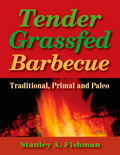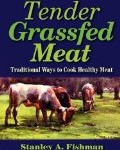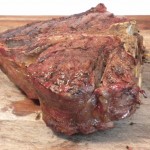When It Comes to Nutrition, We Are All Individuals
By Stanley A. Fishman, author of Tender Grassfed Meat and Tender Grassfed Barbecue

This delicious potato dish will be enjoyed by most, but not by people who are allergic to nightshades.
When it comes to nutritional advice, we are treated as if we are all the same person, with the exact same nutritional needs. Doctors and nutritionists give the same recommendations for what everyone should eat at a certain age.
Individual nutritional needs of the person are ignored, and never considered. The standard is the same for everyone of a certain age group.
Yet the truth of the matter is that each of us is a unique individual, of different sizes, body composition, body chemistry, genes, and many other factors that make each of us unique.
The “one size fits all†approach taken by the medical profession and conventional nutritionists does not really fit anyone.
The Wisdom of Hippocrates
Hippocrates of Kos, the most famous doctor of ancient times, lived well over two thousand years ago. Yet his approach to treating his patients was totally different from the one-size-fits-all approach, and makes a lot more sense.
Hippocrates treated each of his patients as a unique individual, getting to know them. His treatment of choice was diet, which mainly consisted of finding out what foods the patient needed, and providing them. He paid careful attention to how the individual patient responded to the foods he prescribed, and if the desired results were not obtained, he tried something else, either other foods, or rest, or a particular exercise, or any combination of the above. Drugs and surgery were used only as a last resort. Hippocrates was famous for healing most of his patients, and even stopped a plague that was devastating Athens.
The same principle applies to nutrition and natural remedies. What works for one person may not work for another, or may even harm them. In fact, since our nutritional needs often change, what worked at one time may not help another time. The very same food or herbal remedy that heals one person may be useless for another person. This is because our nutritional needs, while very similar to those of other people, are never identical, and often change.
For example, some people are allergic to members of the nightshade family of plants, such as potatoes, and other people thrive on them.
So How Do We Know What to Eat?
Nature has given us the senses we need to determine this. Our senses of taste, smell, sight, and our intuition can tell us what is good for us to eat at a particular time. The healthy peoples studied by Dr. Weston A. Price understood this principle, and had developed a traditional cuisine over the centuries that kept them so healthy that they had no disease, and no need for medical care. Being of a similar heritage and ancestry, the foods that their ancestors ate helped them thrive. Yet even among these so-called primitives, individuals would vary their diet depending on the needs of the moment. They might stop eating a particular food that did not appeal to them at the time, or seek out a particular food that they craved. These patterns were noticed and remembered by these peoples, who would make special foods available to individuals at a certain time, such as recovering from a physical injury, or being pregnant, or wanting to conceive, or many other circumstances.
This is much harder to do in modern society, where food has been industrialized and changed by chemical processing and the use of flavor enhancers. Our senses often cannot tell what industrial foods are good or bad for us, or how much to eat, or how to get particular nutrients.
The solution I have found for myself, is simple.
Just eat real food, as said by Sean Croxton. Our bodies know how to sense and deal with the foods of nature.
Pay attention to how a food smells, tastes, and to your cravings for a particular real food. I find that following my senses and cravings is the best way I have found to know what to eat, and how much.
This only works with real food. The better a particular real food tastes, the better I feel it is for me to eat it at that particular time. And if a food does not appeal to me, or tastes bad, I stop eating it. Often a food that tasted wonderful at the beginning of a meal will not taste as good after I have eaten some of it. This is my body telling me that I have had enough. Our bodies know what we need and how to get it from real food.
Disclaimer: Information found on the Tender Grassfed Meat site, including this article, is meant for educational and informational purposes only. Any statements or claims about the possible health benefits conferred by any foods or anything else have not been evaluated by the Food & Drug Administration and are not intended to diagnose, treat, cure, or prevent any disease. None of the content on the Tender Grassfed Meat site should be relied upon for any purpose, and nothing here is a substitute for a medical diagnosis or medical treatment.
Sorry, the comment form is closed at this time.


 Photos of recipes from the new book Tender Grassfed Barbecue
Photos of recipes from the new book Tender Grassfed Barbecue
 Photos of recipes from the cookbook Tender Grassfed Meat
Photos of recipes from the cookbook Tender Grassfed Meat